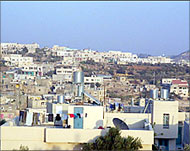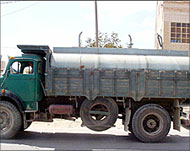Jewish settlers usurp Palestinian water
In the West Bank village of Khursa, fresh water has become a scarce commodity.

The 2000 inhabitants, who live 18km southwest of Hebron, were connected to the water supply grid nearly 10 years ago. But since that time, water has flowed for only two or three months. The water pipes have rusted and fallen into disrepair.
Most of the villagers are forced to draw their water from the village’s ancient well which dates back to the Roman Empire.
The water quality in this well is poor and children often fall ill after drinking from it. It is the only available water source, so the villagers are left with no choice but to use it.
“If you have to choose between drinking contaminated water and dying of thirst, what will you do?” asked one resident.
Villagers who can afford it buy their water on the black market at $3-4 a cubic metre, a hefty sum given the local living standards and the fact that most men in the village have lost their jobs in Israel.
Faced with this chronic problem, most households in the village have dug cisterns to collect rainwater from the roofs of their homes and from the streets.
No house or building is constructed without digging and preparing an underground cistern which, depending on its size, could cost as much as $10,000, a crippling expense for families, many of whom are living below the poverty line.
Villagers also try as much as possible to economise on their water consumption. Water is reused to rinse the floors and flush toilets; people ration what they drink and watering gardens is an unthinkable luxury.
Dire shortage
Khursa is not the only village facing a water crisis. Most of rural Palestine receives little or no water from the decrepit water-supply system in the West Bank. This forces hundreds of thousands of Palestinians to buy water on the black market, especially during the hot summer months.
 |
|
The people of Khursa have to conserve every precious drop |
In the Hebron region alone, which has a population of nearly half a million inhabitants, more than 350,000 Palestinians do not receive regular water supplies.
Over the past few years, the Red Cross and the Palestinian Hydrological Group have stepped up efforts to prevent a catastrophe in dozens of villages, located along the former armistice line between Israel and the West Bank, west of Hebron.
The Red Cross provided 12,000 families in these villages with 20 cubic metres of water every two months.
Some larger towns, like Hebron, Dura, Yatta and Halhul rotate the flow of water to various outlying villages as the amount of water received from the Israeli authorities, who control the water mains, does not meet the minimum needs of the population.
This means that when water is channelled to one neighbourhood, others get no water. In some cases communities wait for up to three months for their turn to receive water.
Outlying areas and those at higher elevations receive less water due to low pressure. Some neighbourhoods receive water only once or twice a year.
Black market
Given the huge demand, the black market in water has become a lucrative business in the occupied territories.
Each Palestinian town now has a fleet of water trucks and containers hauled by tractors, delivering water to homes around the clock.
 |
|
Water trucks like this form the |
The water is pumped from private surface wells, so its quality does not always meet health standards, and hauled in tankers that do not undergo regular maintenance to meet sanitary requirements.
In many instances, the Israeli army blocks access to these private springs by dumping mounds of dirt across the routes, forcing water trucks to travel through rugged and hazardous terrain. This always translates into higher prices for the consumer.
Israelis steal water
Critics lay the blame for the water shortages in the West Bank and Gaza Strip at the door of the Israeli occupation regime, which usurps most of the Palestinian water resources.
Last month, the Deputy-Commissioner of the Palestinian Water Authority, Fadl Kaawash, accused Israel of withholding crucial water supplies from as many as a million Palestinians living in almost 60 villages.
Kaawash, who was speaking during an international meeting in Rome in September, on the growing water crisis in the Middle East, pointed out that Jewish settlements receive the lion’s share of the scarce water supplies in both the West Bank and the Gaza Strip. He called the Israeli behaviour “a crime against humanity.”
According to Umar Awwad, Director-General of the Palestinian Authority Water Resources and Planning Department, in 2002 Israel pumped 62.85 million cubic meter of water a day through the water supply system to the Palestinians. That is just 86 litres per person.
Awwad says up to 40% of this leaks out of the pipelines, leaving an average of only 52 litres per person per day, which is less than half the amount recommended for basic urban consumption.
In stark comparison, an average Jewish settler receives around 400 litres of water per day, or eight times the amount a Palestinian receives.
|
“This population suffers a severe water crisis. They are unable to meet their basic water needs, including basic hygiene, house cleaning and using the toilet and as a result, face significant health risks” B’tselem human rights group report |
Today, there are up to 280,000 Jewish settlers living in the West Bank and as many as 40,000 in the Gaza Strip who receive and consume more than half of the water supplies in the area.
The amount of water diverted to the settlements increases steadily every year while the amount allocated to the 3.6 million Palestinians keeps plummeting proportionately.
Unfair division
Israel, which maintains total control of water resources in the West Bank and Gaza Strip, is well aware of the dire water crisis facing hundreds of thousands of Palestinians, but has apparently chosen to ignore it.
Two years ago, the Israeli Information Center for Human Rights in the Occupied Territories, better known by its acronym, B’tselem, pointed out that 218 Palestinian villages in the West Bank had no running water as Israel refuses to connect them to the water network.
“This population suffers a severe water crisis. They are unable to meet their basic water needs, including basic hygiene, house cleaning and using the toilet and as a result, face significant health risks,” it said in a report
B’tselem attributed the water shortage in the West Bank to two factors, “the extremely inequitable division of the water sources shared by Israel and the Palestinians, and Israel’s failure to invest in water infrastructure through the years of the occupation.”